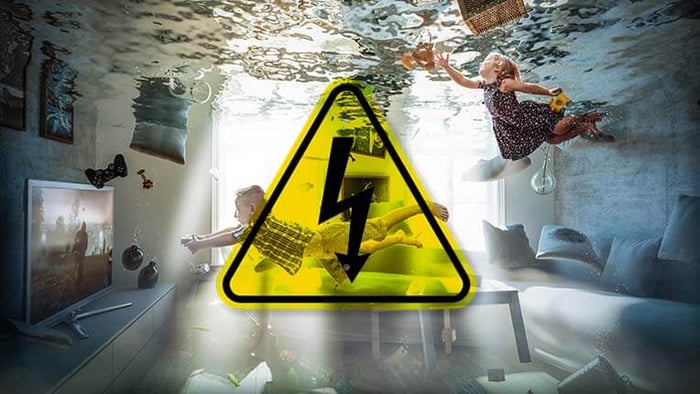Getting electrocuted is one of the most significant hazards during and after a flood. Many people forget about the danger of Electricity and tend to get shocked trying to walk or swim through a flooded area or entering a previously flooded building before making sure that the power is off.
Although it is pretty logical that when the disaster strikes, you will probably have some other crucial things on your mind, electricity safety is one of the critical survival aspects during any flooding, no matter how intense or destructive it can seem.
In this article, we shall talk about fundamental rules that will help you stay safe and prevent electrocution during the flood or after it when you start the clean-up process.
The essentials of electrical safety in case of flooding.
You don't have to be a skilled handyperson or a physicist to know about the dangers of water getting in contact with electricity. However, 5 pretty basic yet perfectly efficient rules will help you and your family stay safe and prevent electrocution in case of flooding:

Rule# 1 - Use protection!
Electric shock happens when our bare skin, a perfect electricity conductor, gets in contact with "electrocuted" water, another natural power conductor.
Therefore, you should never try to walk through a flooded area bare-footed. And, of course, never attempt to swim across a flooded basement or room.
In case you absolutely have to cross the area, which could have potentially got electrocuted, make sure to wear high rubber boots or any other protective footwear made out of material that cannot soak water or conduct electricity.
Rule#2 - Don't be a hero!
Many people attempt to turn off the power in the breaker box themselves and get electrocuted, unaware of fundamental safety rules.
In case you stand in water when you touch the breaker box or touch it with wet hands, you turn your body into a natural electricity conductor, which can lead to a fatal shock.
It is always better to address a professional, an experienced electrician, instead of taking measures yourself.
Rule#3 - try not to touch anything.
For the reasons described above, it is better to avoid touching any electric appliance, wires, or other objects that can potentially conduct electricity if you are not 100% sure that the power is off.
Also, make sure to explain to your family members and especially children that they should not touch anything, especially if their hands are wet or they stand in water.

Rule#4 - Secure electric tools and appliance
Once you see that the water is coming, it is essential to secure the electric tools and appliances, raising them above the area that can get flooded.
You may need all those tools right after the flood or for securing yourself or evacuating the house during the disaster. Not to mention the fact they may be pretty costly and, after getting wet, can be damaged beyond repair.
Rule#5 - Don't use any appliance unless you are sure that it is safe!
Last but not least, don't use any electric tools or appliances in case you have the slightest suspicion that they could have been affected by water.
It is always better to have a professional check every item before you try to plug it in and wear protective rubber gloves that don't conduct electricity by all means.
In case a professional says that the tool might have been damaged, don't try to fix it yourself or hope that "it will dry out and everything will be fine." the trick with a phone put in rice only works in social media posts and hardly ever proves to be efficient.
At the same time, another family member can be clueless about the potential danger. Start using the tool and get an electric shock if you don't take the essential precautions and notify everyone around you about the potential hazard.
How to prevent electrical hazards in case of a flood?
When you build or reconstruct your house, especially the one located in a floodplain, every contractor will strongly recommend you elevate all sockets and electric systems above the potential flood level.
However, the most efficient way to protect you and your family members from electrical hazards during a flood is to prevent water from entering the house at all.
There are numerous solutions and devices today that can block the passages and minimize the danger of leakage.
Flood Barriers are among the most efficient devices, which have been tested worldwide and have proven themselves efficient to thousands of house and business owners. Those barriers seal the passage securely and are designed tall and durable enough to withstand the most severe flooding.
Moreover, Dam Easy flood barriers are particularly easy to install and remove, which makes flood protection easily accessible for anyone. Once the water retreats, you can easily disassemble your flood barrier and store it safely in your garage, basement, or even behind the door till the next flooding.
Contact Dam Easy now and learn about our Flood Gates and numerous other solutions that will help you make your house a safe and secure fortress in the middle of the most severe disaster.
We shall be happy to answer all your questions and create a personalized kit according to your property's measurements and architectural peculiarities to guarantee that the subsequent flooding in your area won't do any harm to you or your beloved ones.
Flood Barrier Door Dam - Ultimate Flood Gate

€779,00
DAM EASY® FLOOD GATE - DOOR DAM Floods are becoming more common around the world. What was once a 100-year phenomenon is now a seasonal trend that homeowners must deal with. That’s EXACTLY why you need this Dam Easy Flood… Read More



